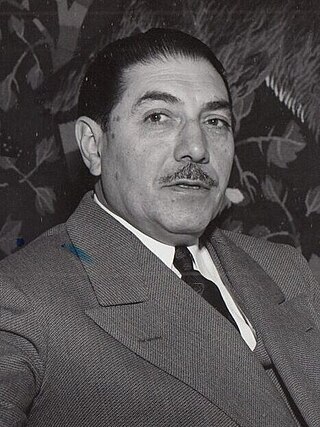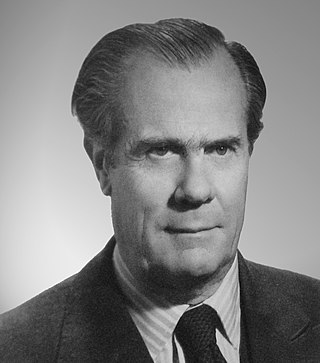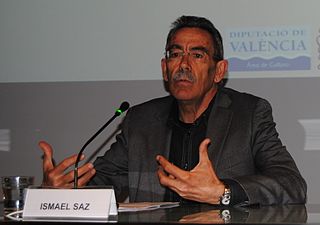
Francoist Spain, also known as the Francoist dictatorship, was the period of Spanish history between 1936 and 1975, when Francisco Franco ruled Spain after the Spanish Civil War with the title Caudillo. After his death in 1975 due to a heart attack, Spain transitioned into a democracy. During this time period, Spain was officially known as the Spanish State.

Carlos Arias Navarro, 1st Marquess of Arias Navarro was the prime Minister of Spain during the final years of the Francoist dictatorship and the beginning of the Spanish transition to democracy.

The Spanish transition to democracy, known in Spain as la Transición or la Transición española, is a period of modern Spanish history encompassing the regime change that moved from the Francoist dictatorship to the consolidation of a parliamentary system, in the form of constitutional monarchy under Juan Carlos I.

Epsy Alejandra Campbell Barr is a Costa Rican politician and economist who served as the Vice-president of Costa Rica from 8 May 2018 to 8 May 2022. She is the first woman of African descent to be vice president in Costa Rica and in Latin America.

Luis Padilla Nervo was a Mexican politician and diplomat. He was the first Mexican Ambassador at the United Nations, Minister of Foreign Affairs and President of the Sixth Session of United Nations General Assembly.

Mexico–Yugoslavia relations were historical foreign relations between Mexico and now split-up Socialist Federal Republic of Yugoslavia. Mexico and Yugoslavia established diplomatic relations on 24 May 1946 on the initiative of the President of Yugoslavia Josip Broz Tito. Both countries shared their views on Francoist Spain and cooperated with the Spanish Republican government in exile. On 31 July 1952 the two countries protested strongly against a decision of a United Nations committee to ask the Franco Government what it might be able to do to strengthen the collective security.
Arriba was a Spanish daily newspaper published in Madrid between 1935 and 1979. It was the official organ of the Falange, and also of the regime during the Franco rule in the country.

Modesto Seara Vázquez was a Spanish-born Mexican jurist and academic. He lived in several countries but has spent most of his life in Mexico. He has actively participated in Mexican life as a professor at the National Autonomous University of Mexico and since 1988 as the Rector of the Oaxaca State University System in the State of Oaxaca. He died in Mexico City on 26 December 2022, at the age of 91.
Events in the year 1946 in Spain.

The Spanish question was the set of geopolitical and diplomatic circumstances that marked the relationship between Spain and the United Nations between 1945 and 1955, centred on the UN's refusal to admit Spain to the organization due to Francoist Spain's sympathy for the Axis powers, defeated in World War II.

José Solís Ruiz was a Spanish politician, known for his role in Francoist Spain, during which he occupied a number of important posts.

Women's suffrage in Francoist Spain and the democratic transition was constrained by age limits, definitions around heads of household and a lack of elections. Women got the right to vote in Spain in 1933 as a result of legal changes made during the Second Spanish Republic. Women lost most of their rights after Franco came to power in 1939 at the end of the Spanish Civil War, with the major exception that women did not universally lose their right to vote. Repression of the women's vote occurred nevertheless as the dictatorship held no national democratic elections between 1939 and 1977.

Eduardo Alejandro Roca was an Argentine lawyer, academic, and diplomat. He was Ambassador of Argentina to the United States (1968–1970) and was appointed as a permanent representative to the United Nations during the 1982 Falklands War.

Spain–Syria relations are the bilateral and diplomatic relations between these two countries. Syria has an embassy in Madrid. Spain has an embassy in Damascus. Both countries are charter members of the Union for the Mediterranean, although Syria suspended its membership in 2011.

Ismael Saz Campos is a Spanish historian, specialised in the study of Falangism, Francoist Spain and the Spanish-Italian relations during the Spanish Civil War. He is a professor at the University of Valencia.

The Línea P, officially the Pyrenees Defense Organisation, was a fortified line of defense built in the Pyrenees between 1944 and 1948 to prevent an invasion into Spanish territory.

Licinio de la Fuente y de la Fuente was a Spanish Francoist politician who served as Minister of Labour from 1969 to 1975. Promoter of the Democracia Social party during the Spanish Transition, he was one of the "Magnificent Seven", the seven political leaders who founded the federation of People's Alliance (AP) in 1976.

Egriselda López is a Salvadoran diplomat.
The Permanent Representative of Argentina to the United Nations is the official representative of the government of Argentina to the United Nations.

The Government-in-exile of José Giral—also known by its supporters as el gobierno de la esperanza— was an executive branch created on 21 August 1945 by the institutions of the Second Spanish Republic in exile and headed by José Giral, the former prime minister during the first months of the Civil War. It tried to put up a united front before the United Nations and the international community with the aim of isolating General Francisco Franco's regime, as well as obtaining international recognition as the only legitimate government of Spain in order to reestablish the Republic.


















